'Where Do You Get Your Ideas?'
By Maggie James
The most popular question to ask novelists
 Novelists get asked this question more than any other. It's as if people think there are certain, very specific, stimuli that give rise to ideas for novel plots, and others that don't. Not so! Inspiration can be found everywhere, if you know where to look. When I'm asked where I get my ideas, I say 'from the world around me.' Writers tend to be great at observation, particularly people watching. Like many authors, I always have to hand a way of capturing ideas when they strike, whether it's via my phone or pen and paper. Right now, I have over fifty plot possibilities listed on my computer, and I'm betting that other authors may have double or triple that number.
Novelists get asked this question more than any other. It's as if people think there are certain, very specific, stimuli that give rise to ideas for novel plots, and others that don't. Not so! Inspiration can be found everywhere, if you know where to look. When I'm asked where I get my ideas, I say 'from the world around me.' Writers tend to be great at observation, particularly people watching. Like many authors, I always have to hand a way of capturing ideas when they strike, whether it's via my phone or pen and paper. Right now, I have over fifty plot possibilities listed on my computer, and I'm betting that other authors may have double or triple that number.
Novelists are capable of weaving plot ideas from virtually any situation. Take a simple example. I'm in a cafe, staring out of the window, and I spot a woman crossing the road. She's hurrying, her expression clouded; a small girl is clutching her hand. Immediately, this sparks several plot possibilities. Where does she need to get to so fast, and why? Is she running from something or someone? If so, what or whom? Is the child her own, or has she snatched her? What's causing her to look so worried? One very ordinary scenario, but with so much potential!
Posing questions is a useful tactic
 That's not to say every idea is worthy of being turned into a full-length book. Many aren't. An idea needs to be capable of sustaining characters and plot, and some might be better suited to a short story or subplot. When the right idea strikes, though, it's an amazing moment, at least for me. I get a strong gut instinct, telling me 'this is IT!' Intense excitement follows; for hours afterwards, my brain won't stop buzzing with ways to develop the idea into a novel.
That's not to say every idea is worthy of being turned into a full-length book. Many aren't. An idea needs to be capable of sustaining characters and plot, and some might be better suited to a short story or subplot. When the right idea strikes, though, it's an amazing moment, at least for me. I get a strong gut instinct, telling me 'this is IT!' Intense excitement follows; for hours afterwards, my brain won't stop buzzing with ways to develop the idea into a novel.
Television news and the press are useful for gathering ideas. Say, for example, I read about a hit-and-run accident. I immediately focus on the emotions involved, posing questions such as 'what if?' and 'how would that feel?' What mental turmoil must the driver be experiencing? Was he/she concerned about financial problems/their marriage/work issues, leading to careless driving? What will the consequences be? How is the victim's family coping? All rich sources of inspiration for the plot or subplot of a future novel!
Themes as a source of inspiration
 Something else I find works well is to consider themes that appeal, ones evoking strong emotions. I turn a subject over in my brain, spinning out from a one-word premise, such as obsession, all the possibilities that arise. A mental mind map, if you like!
Something else I find works well is to consider themes that appeal, ones evoking strong emotions. I turn a subject over in my brain, spinning out from a one-word premise, such as obsession, all the possibilities that arise. A mental mind map, if you like!
For my fifth novel, I'm drawn to the theme of betrayal. Duplicity elicits fierce emotions, from a desire for revenge to suicidal impulses. How did this idea originate? Television again. I watched a BBC documentary on the subject of con artists. As the sad stories unfolded, that familiar gut feeling hit me hard - YES! I knew I'd found the material for a future novel plot. I've yet to flesh out the story and characters, but my mind's buzzing with possibilities.
Other potential sources of inspiration? This doesn't work for me, but many writers report using daydreaming or dreams themselves to spark their creativity. One of my novelist friends told me the plot of her first book came to her as she slept. Others say meditation or creative visualisation helps.
Enter Plot Monkey! Just for amusement...
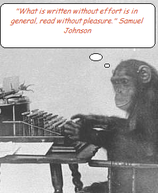 For fun last year, I tried out a piece of software (no longer available) called Plot Monkey. It's a random idea generator, based on who, what, how, when and where. Using those criteria, or whichever ones you select, it generates plot ideas. The results are hilarious. Take this gem it produced:
For fun last year, I tried out a piece of software (no longer available) called Plot Monkey. It's a random idea generator, based on who, what, how, when and where. Using those criteria, or whichever ones you select, it generates plot ideas. The results are hilarious. Take this gem it produced:
Two small boys wipe out an outlaw gang using a hammer to win fame during the civil war in Australia.
Well, that's expanded my education! I was unaware Australia ever had a civil war...
Or this: A herpetologist tries to destroy an Army base by being unfaithful to hide the truth during the civil war alongside a boat.
Looks like our resident monkey has a thing for civil conflict...
Here's my favourite, seeing as my forthcoming novel, The Second Captive, examines Stockholm syndrome:
A person suffering from Stockholm Syndrome plays a deadly game with a hack saw to prove a point in the future in the desert.
Nope, no hack saws or deserts in The Second Captive! Sorry, Plot Monkey, I'll carry on getting ideas as and when they arise - you stick to finding your next banana!
How would it feel to discover you'd been abducted as a child?
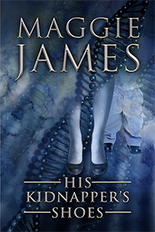 Click the image! To illustrate the diverse sources of novel ideas, let's look at how I got the inspiration for my own books, starting with His Kidnapper's Shoes. In 2010, I was chatting with fellow travellers in Vietnam, discussing what happens when children disappear. I ventured the opinion that most, sadly, are killed by opportunistic predators. One woman disagreed. 'I suspect sometimes they're stolen to order,' she said. 'For childless couples, who, for whatever reason, can't adopt.'
Click the image! To illustrate the diverse sources of novel ideas, let's look at how I got the inspiration for my own books, starting with His Kidnapper's Shoes. In 2010, I was chatting with fellow travellers in Vietnam, discussing what happens when children disappear. I ventured the opinion that most, sadly, are killed by opportunistic predators. One woman disagreed. 'I suspect sometimes they're stolen to order,' she said. 'For childless couples, who, for whatever reason, can't adopt.'
That got me thinking. What would it be like to discover you'd been abducted as a child? How would someone react on finding out the woman who raised them is a kidnapper? I love examining strong emotions, and such a situation would spark off intense feelings: anger, betrayal, and the desire to unearth the truth.
When obsessive love leads to murder
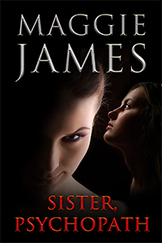 Click the image! Let's turn now to my second novel, Sister, Psychopath. Several years ago, I attended a one-day writing course, during which the conversation turned to a real-life murder case. Our teacher told us about a woman who became obsessed with a man, believing herself in love. So much so that she decided to kill his wife and child in the hope of marrying him. She carried out her plan, but her daughter suspected what she'd done, leading to her mother's arrest and conviction.
Click the image! Let's turn now to my second novel, Sister, Psychopath. Several years ago, I attended a one-day writing course, during which the conversation turned to a real-life murder case. Our teacher told us about a woman who became obsessed with a man, believing herself in love. So much so that she decided to kill his wife and child in the hope of marrying him. She carried out her plan, but her daughter suspected what she'd done, leading to her mother's arrest and conviction.
When I heard this, I knew I had the basis for a novel. Lots of questions jumped out at me. How would it feel to be the daughter in this situation? Or the woman herself, obsessed to the point of murder? What about the subject of her infatuation, a man now bereft of his family?
In the end, I centred on the daughter's story by creating the character of Megan Copeland, and changed the events to attempted murder, with no child involved. The novel ended up taking a different route, concentrating instead on the relationship between Megan and her sociopathic half-sister, Chloe. Psychopathy always provides plenty of material for novelists!
Discovering someone you love has a secret past
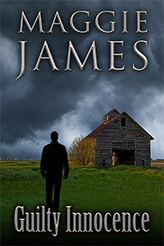 Click the image! I don't remember the exact source of inspiration for my third novel, Guilty Innocence. I suspect I heard about some terrible crime via the television news, because I do recall the idea came from the premise: how would it feel to discover someone you love has a secret past? That sparked a host of other questions. What could be so awful you'd need to keep it secret? How might the truth be revealed?
Click the image! I don't remember the exact source of inspiration for my third novel, Guilty Innocence. I suspect I heard about some terrible crime via the television news, because I do recall the idea came from the premise: how would it feel to discover someone you love has a secret past? That sparked a host of other questions. What could be so awful you'd need to keep it secret? How might the truth be revealed?
Serious crime seemed the best reason for such a cover-up, which begged the question: what, exactly? The answer was child murder; no other crime incites such passions in the public mind. The twist is that Mark Slater is innocent of the killing of two-year-old Abby Morgan. This doesn't mean he's without his demons to slay; his wrongful conviction has always eaten away at him. In addition, he has his nemesis, the twisted and violent Adam Campbell, to confront...
When victims become emotionally attached to their abusers
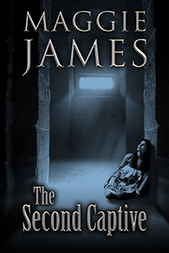 Available soon! Finally, let's look at my fourth novel, The Second Captive. This has not yet been published, although it soon will be. The book examines the fascinating psychological condition known as Stockholm syndrome, in which victims become emotionally attached to their abusers. Fertile ground for novelists!
Available soon! Finally, let's look at my fourth novel, The Second Captive. This has not yet been published, although it soon will be. The book examines the fascinating psychological condition known as Stockholm syndrome, in which victims become emotionally attached to their abusers. Fertile ground for novelists!
The inspiration for this book came from hearing about a young woman who returned home after an absence of several years, in a distressed state, but wouldn't say what had happened to her. I was instantly intrigued. Why was she refusing to talk? Where had she been, and with whom? Stockholm syndrome came to mind as the answer. A vulnerable individual, held captive in an abusive situation, who's too ashamed after her escape to reveal the truth. And so the character of Beth Sutton was born, along with the disturbed and dangerous Dominic Perdue, her captor...
For news of The Second Captive's publication, why not sign up for my newsletter? Enter your details in the box at the top of the side bar.
Let's hear from you!
I hope you have enjoyed this blog post, and that it's given you some insight into the creative process for fiction writers. Are there any questions you'd like to ask on the topic? If you're a writer, do you get your ideas from specific sources, such as meditation or visualisation? Leave a comment and let me know!
Subscribe to my newsletter and blog!
 I'd love to stay in contact with you! Why not sign up for my newsletter? It's an occasional communication to keep you informed about my new novel releases. I respect your privacy and will never sell your details to any third parties. To sign up, enter your details in the form at the top of the sidebar.
I'd love to stay in contact with you! Why not sign up for my newsletter? It's an occasional communication to keep you informed about my new novel releases. I respect your privacy and will never sell your details to any third parties. To sign up, enter your details in the form at the top of the sidebar.
And if you've enjoyed this blog post, how about subscribing via RSS feed or email? Either click the links in my blog sidebar or sign up via Networked Blogs, also in the sidebar. It'll be great to have you on board!
The most popular question to ask novelists
 Novelists get asked this question more than any other. It's as if people think there are certain, very specific, stimuli that give rise to ideas for novel plots, and others that don't. Not so! Inspiration can be found everywhere, if you know where to look. When I'm asked where I get my ideas, I say 'from the world around me.' Writers tend to be great at observation, particularly people watching. Like many authors, I always have to hand a way of capturing ideas when they strike, whether it's via my phone or pen and paper. Right now, I have over fifty plot possibilities listed on my computer, and I'm betting that other authors may have double or triple that number.
Novelists get asked this question more than any other. It's as if people think there are certain, very specific, stimuli that give rise to ideas for novel plots, and others that don't. Not so! Inspiration can be found everywhere, if you know where to look. When I'm asked where I get my ideas, I say 'from the world around me.' Writers tend to be great at observation, particularly people watching. Like many authors, I always have to hand a way of capturing ideas when they strike, whether it's via my phone or pen and paper. Right now, I have over fifty plot possibilities listed on my computer, and I'm betting that other authors may have double or triple that number.Novelists are capable of weaving plot ideas from virtually any situation. Take a simple example. I'm in a cafe, staring out of the window, and I spot a woman crossing the road. She's hurrying, her expression clouded; a small girl is clutching her hand. Immediately, this sparks several plot possibilities. Where does she need to get to so fast, and why? Is she running from something or someone? If so, what or whom? Is the child her own, or has she snatched her? What's causing her to look so worried? One very ordinary scenario, but with so much potential!
Posing questions is a useful tactic
 That's not to say every idea is worthy of being turned into a full-length book. Many aren't. An idea needs to be capable of sustaining characters and plot, and some might be better suited to a short story or subplot. When the right idea strikes, though, it's an amazing moment, at least for me. I get a strong gut instinct, telling me 'this is IT!' Intense excitement follows; for hours afterwards, my brain won't stop buzzing with ways to develop the idea into a novel.
That's not to say every idea is worthy of being turned into a full-length book. Many aren't. An idea needs to be capable of sustaining characters and plot, and some might be better suited to a short story or subplot. When the right idea strikes, though, it's an amazing moment, at least for me. I get a strong gut instinct, telling me 'this is IT!' Intense excitement follows; for hours afterwards, my brain won't stop buzzing with ways to develop the idea into a novel.Television news and the press are useful for gathering ideas. Say, for example, I read about a hit-and-run accident. I immediately focus on the emotions involved, posing questions such as 'what if?' and 'how would that feel?' What mental turmoil must the driver be experiencing? Was he/she concerned about financial problems/their marriage/work issues, leading to careless driving? What will the consequences be? How is the victim's family coping? All rich sources of inspiration for the plot or subplot of a future novel!
Themes as a source of inspiration
 Something else I find works well is to consider themes that appeal, ones evoking strong emotions. I turn a subject over in my brain, spinning out from a one-word premise, such as obsession, all the possibilities that arise. A mental mind map, if you like!
Something else I find works well is to consider themes that appeal, ones evoking strong emotions. I turn a subject over in my brain, spinning out from a one-word premise, such as obsession, all the possibilities that arise. A mental mind map, if you like!For my fifth novel, I'm drawn to the theme of betrayal. Duplicity elicits fierce emotions, from a desire for revenge to suicidal impulses. How did this idea originate? Television again. I watched a BBC documentary on the subject of con artists. As the sad stories unfolded, that familiar gut feeling hit me hard - YES! I knew I'd found the material for a future novel plot. I've yet to flesh out the story and characters, but my mind's buzzing with possibilities.
Other potential sources of inspiration? This doesn't work for me, but many writers report using daydreaming or dreams themselves to spark their creativity. One of my novelist friends told me the plot of her first book came to her as she slept. Others say meditation or creative visualisation helps.
Enter Plot Monkey! Just for amusement...
 For fun last year, I tried out a piece of software (no longer available) called Plot Monkey. It's a random idea generator, based on who, what, how, when and where. Using those criteria, or whichever ones you select, it generates plot ideas. The results are hilarious. Take this gem it produced:
For fun last year, I tried out a piece of software (no longer available) called Plot Monkey. It's a random idea generator, based on who, what, how, when and where. Using those criteria, or whichever ones you select, it generates plot ideas. The results are hilarious. Take this gem it produced:Two small boys wipe out an outlaw gang using a hammer to win fame during the civil war in Australia.
Well, that's expanded my education! I was unaware Australia ever had a civil war...
Or this: A herpetologist tries to destroy an Army base by being unfaithful to hide the truth during the civil war alongside a boat.
Looks like our resident monkey has a thing for civil conflict...
Here's my favourite, seeing as my forthcoming novel, The Second Captive, examines Stockholm syndrome:
A person suffering from Stockholm Syndrome plays a deadly game with a hack saw to prove a point in the future in the desert.
Nope, no hack saws or deserts in The Second Captive! Sorry, Plot Monkey, I'll carry on getting ideas as and when they arise - you stick to finding your next banana!
How would it feel to discover you'd been abducted as a child?
 Click the image! To illustrate the diverse sources of novel ideas, let's look at how I got the inspiration for my own books, starting with His Kidnapper's Shoes. In 2010, I was chatting with fellow travellers in Vietnam, discussing what happens when children disappear. I ventured the opinion that most, sadly, are killed by opportunistic predators. One woman disagreed. 'I suspect sometimes they're stolen to order,' she said. 'For childless couples, who, for whatever reason, can't adopt.'
Click the image! To illustrate the diverse sources of novel ideas, let's look at how I got the inspiration for my own books, starting with His Kidnapper's Shoes. In 2010, I was chatting with fellow travellers in Vietnam, discussing what happens when children disappear. I ventured the opinion that most, sadly, are killed by opportunistic predators. One woman disagreed. 'I suspect sometimes they're stolen to order,' she said. 'For childless couples, who, for whatever reason, can't adopt.'That got me thinking. What would it be like to discover you'd been abducted as a child? How would someone react on finding out the woman who raised them is a kidnapper? I love examining strong emotions, and such a situation would spark off intense feelings: anger, betrayal, and the desire to unearth the truth.
When obsessive love leads to murder
 Click the image! Let's turn now to my second novel, Sister, Psychopath. Several years ago, I attended a one-day writing course, during which the conversation turned to a real-life murder case. Our teacher told us about a woman who became obsessed with a man, believing herself in love. So much so that she decided to kill his wife and child in the hope of marrying him. She carried out her plan, but her daughter suspected what she'd done, leading to her mother's arrest and conviction.
Click the image! Let's turn now to my second novel, Sister, Psychopath. Several years ago, I attended a one-day writing course, during which the conversation turned to a real-life murder case. Our teacher told us about a woman who became obsessed with a man, believing herself in love. So much so that she decided to kill his wife and child in the hope of marrying him. She carried out her plan, but her daughter suspected what she'd done, leading to her mother's arrest and conviction.When I heard this, I knew I had the basis for a novel. Lots of questions jumped out at me. How would it feel to be the daughter in this situation? Or the woman herself, obsessed to the point of murder? What about the subject of her infatuation, a man now bereft of his family?
In the end, I centred on the daughter's story by creating the character of Megan Copeland, and changed the events to attempted murder, with no child involved. The novel ended up taking a different route, concentrating instead on the relationship between Megan and her sociopathic half-sister, Chloe. Psychopathy always provides plenty of material for novelists!
Discovering someone you love has a secret past
 Click the image! I don't remember the exact source of inspiration for my third novel, Guilty Innocence. I suspect I heard about some terrible crime via the television news, because I do recall the idea came from the premise: how would it feel to discover someone you love has a secret past? That sparked a host of other questions. What could be so awful you'd need to keep it secret? How might the truth be revealed?
Click the image! I don't remember the exact source of inspiration for my third novel, Guilty Innocence. I suspect I heard about some terrible crime via the television news, because I do recall the idea came from the premise: how would it feel to discover someone you love has a secret past? That sparked a host of other questions. What could be so awful you'd need to keep it secret? How might the truth be revealed?Serious crime seemed the best reason for such a cover-up, which begged the question: what, exactly? The answer was child murder; no other crime incites such passions in the public mind. The twist is that Mark Slater is innocent of the killing of two-year-old Abby Morgan. This doesn't mean he's without his demons to slay; his wrongful conviction has always eaten away at him. In addition, he has his nemesis, the twisted and violent Adam Campbell, to confront...
When victims become emotionally attached to their abusers
 Available soon! Finally, let's look at my fourth novel, The Second Captive. This has not yet been published, although it soon will be. The book examines the fascinating psychological condition known as Stockholm syndrome, in which victims become emotionally attached to their abusers. Fertile ground for novelists!
Available soon! Finally, let's look at my fourth novel, The Second Captive. This has not yet been published, although it soon will be. The book examines the fascinating psychological condition known as Stockholm syndrome, in which victims become emotionally attached to their abusers. Fertile ground for novelists!The inspiration for this book came from hearing about a young woman who returned home after an absence of several years, in a distressed state, but wouldn't say what had happened to her. I was instantly intrigued. Why was she refusing to talk? Where had she been, and with whom? Stockholm syndrome came to mind as the answer. A vulnerable individual, held captive in an abusive situation, who's too ashamed after her escape to reveal the truth. And so the character of Beth Sutton was born, along with the disturbed and dangerous Dominic Perdue, her captor...
For news of The Second Captive's publication, why not sign up for my newsletter? Enter your details in the box at the top of the side bar.
Let's hear from you!
I hope you have enjoyed this blog post, and that it's given you some insight into the creative process for fiction writers. Are there any questions you'd like to ask on the topic? If you're a writer, do you get your ideas from specific sources, such as meditation or visualisation? Leave a comment and let me know!
Subscribe to my newsletter and blog!
 I'd love to stay in contact with you! Why not sign up for my newsletter? It's an occasional communication to keep you informed about my new novel releases. I respect your privacy and will never sell your details to any third parties. To sign up, enter your details in the form at the top of the sidebar.
I'd love to stay in contact with you! Why not sign up for my newsletter? It's an occasional communication to keep you informed about my new novel releases. I respect your privacy and will never sell your details to any third parties. To sign up, enter your details in the form at the top of the sidebar.And if you've enjoyed this blog post, how about subscribing via RSS feed or email? Either click the links in my blog sidebar or sign up via Networked Blogs, also in the sidebar. It'll be great to have you on board!
Published on October 23, 2014 06:43
No comments have been added yet.



